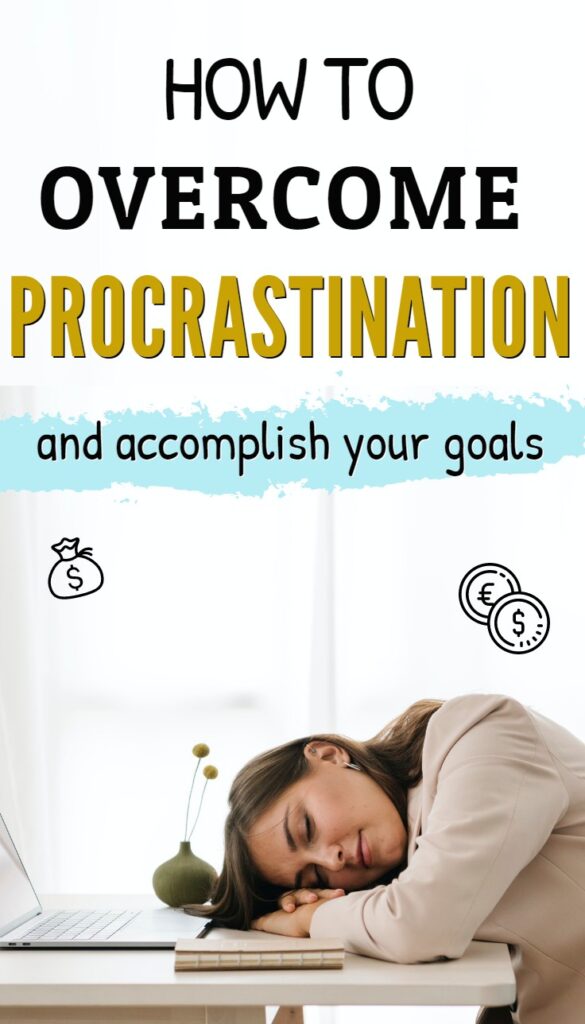Why Do I Procrastinate And How To Stop Procrastinating
You are constantly delaying tasks that have a deadline and wondering why this is happening? Do you know that procrastination is the reason for this? Do you want to know how to stop procrastinating?
Yes, you want to finish your tasks on time and be successful. And you are not lazy, procrastination is not laziness.
It is an active process that you choose to do something else (not so important) instead of doing the important task or things.
Procrastination is the number one cause for low productivity, low income, miss out on achieving goals and so much more. It is a simple thing that we should learn to avoid.
There are many ways on how to stop procrastinating. We will present to you some of them and also introduce you to the reasons for procrastination and how to deal with them.
” You may delay, but time will not.”
Benjamin Franklin
How To Stop Procrastinating
#1 Step: Recognise that you’re procrastinating
If you switch focus because you want to avoid doing something or if you’re putting things off indefinitely, well yes you are procrastinating. You are also procrastinating if you:
- Read e-mails several times a day, without deciding on what to do with them
- Start something important and then you stand up and go to make a coffee
- Wait for the “right time” to tackle a task
- Fill your day with low priority tasks, instead of doing what is important
If you are briefly delaying some important tasks for a good reason (not to make coffee or scroll through social media) then that is not necessarily procrastinating.
#2 Step: Change Your Environment
The number one thing that has a really big effect on our productivity is the environment (our workspace). Do your work desk and room make you want to work or do they make you sleepy and unfocused?
The first thing you want to do is to maintain a work environment conducive to productivity and have an organized place.
Decorate your work environment with some photos and inspirational quotes. Keep your favorite mug on the desk, leave enough space for your laptop, declutter once in a few ways, keep your desk clean.
A work environment that makes us feel inspired can help us to increase our productivity and focus.
#3 Step: Measure and Compensate
In a study published in the European Journal of Personality, scientists investigated the role of impulsivity in procrastinators’ problems.
Students were investigated in two different studies.
The first study data revealed that procrastination was closely related to a lack of perseverance. That is, the inability to complete projects. This relation explained a large part of the well-documented relation between conscientiousness and procrastination.
The data from the second research revealed that all students tend to postpone the bulk of their study activities to the last week before an exam. And that this trend could nicely be described by a hyperbolic curve.
The results also revealed that procrastinators postponed more of their intentions, mainly because of fun alternatives, but did not intend to study less or later. On the contrary, they even seemed to compensate for their vulnerability by formulating more intentions earlier.
If we summarise this it comes that if we want to stop procrastinating we need to find a way to love our work and to love what we do.
If some thought comes to our mind (a fun thing to do), we should learn how to put that thought away and concentrate on our current work.
#4 Step: Create Specific Deadlines
Another effective way to stop procrastinating is to create more than 1 deadline. When we have one deadline we get the impression that we have time and we keep pushing things back until it is too late.
The solution is to break your project into smaller tasks, and put on those tasks specific deadlines. This way you will need to finish each task on a specific date and if you don’t do that your whole plan will be ruined.
Make your daily task list with a call to action that you just accomplish by the specific date. Otherwise, it will be hard to accomplish your goals and you can’t stop procrastinating.
#5 Step: Acquire Anti-Procrastination Strategies
Because procrastination is a habit and habits can’t be broken overnight, you must practice. So by practicing other habits, you are replacing old ones with new, better ones.
Self-forgiveness. In a study published in Science Direct named I forgive myself, now I can study: How self-forgiveness for procrastinating can reduce future procrastination researches examined the association between forgiving the self for a specific instance of procrastination and procrastination on that same task in the future.
They found out that self-forgiveness can help you to feel more positive about yourself. Also, reduce the possibility of procrastination in the future.
So, it is important to forgive yourself for procrastinating in the past to stop this habit in the present and the future.
Focus on doing not avoiding. Commit to the task, write down everything you need to do, and give yourself specific dates to finish. Read again step #4.
Take action. Don’t let your tasks build up, tackle tasks as soon as they arise. By putting away for later they just build up and you will be in a situation where you don’t know where to start.
Avoid distractions. Turn off your social media and email notifications. Turn off your TV.
You could try some music for studying or for work, but focus and concentrate on the task and this music will help you to decrease the outside noise.
Put pressure on yourself. Like in self-help groups find someone to monitor you. It shouldn’t be a person in today’s digital era it can be a super-effective app.
You can stop procrastinating by installing and using the Procraster app.
” A year from now you may wish you had started today.”
Karen Lamb
Why Am I Procrastinating (Reasons for Procrastination)
You don’t have productivity time
Some people are more productive in the mornings and some others in the afternoon. If someone is successful you know to do his important tasks in the morning it doesn’t mean that you should do the same.
Find what time of the day you are most productive and focus on that time to do all important tasks.
You are prone to distractions
One other reason for procrastination is that you can be easily distracted. If you have your smartphone near you while you work and notifications beep over and over.
You have opened many tabs on your computer and you go from one to another.
You must be aware of what is taking your focus (distracting) and take some steps to eliminate that. It is simple, you should turn off your phone notifications while you are working.
Go finish one task, and when it is complete go on the other.
Perfectionism
Another common cause of procrastination is excessive perfectionism. The thing is that if you are a perfectionist you might find it difficult to take any action unless you know that you can do the job with which you will be totally satisfied.
This often happens when you need to start something new or doing something different than before. This is maybe similar to the concept of “fear of failure.”
In this case, instead of being afraid of failure, you are afraid that you can’t meet your high standards.
Solution: Accept that there is no such thing as a perfect job, aim to do your best, and be happy with the output.
Indecisiveness
People sometimes don’t know how to stop procrastinating because they are unable to make decisions promptly.
For example, a person might delay getting started on their article because they can’t decide on which topic to write.
Another example of indecisiveness is when a person might delay the start of a diet because they can’t decide which diet plan to follow.
Various factors generally make it more likely that someone will get stuck over-thinking the situation while trying to make a decision*, a phenomenon which is sometimes referred to as analysis paralysis or choice paralysis.
The main factors to consider, from a practical perspective, are the following:
The more options you have, the harder it will be for you to choose. Essentially, the more options you have to choose from, the harder it will be for you to evaluate them and decide which one is preferable.
The more similar your options are to one another, the harder it will be for you to choose. Essentially, the more similar the available options are, and the closer they are in value, the harder it will be for you to decide which one is better.
Especially in cases where there isn’t a single option that is preferable to the others.
The more important the choice is, the harder it will be for you to choose. Essentially, the greater the consequences of making a decision, the harder it will be for you to finalize your decision so that you are generally more likely to delay before making a major decision than you are before making a minor one.
You should know that this form of procrastination refers to decisional procrastination, which is the opposite of behavioral procrastination.
The first one involves a delay in making a decision and the second one involves a delay in performing a task once you’ve decided on your preferred course of action.
Anxiety
Another contributor to procrastination is anxiety. You can’t stop procrastinating because you may feel anxious about a task you have to handle.
This issue can be especially problematic in cases where a person’s anxiety increases as a result of their procrastination.
This can lead to a feedback loop where someone feels anxious about a certain task, which causes them to procrastinate instead of doing it.
This makes them even more anxious, which in turn causes them to procrastinate even further.
Some simple breathing exercises can help you to calm down when you are stressed and anxious, you can find them here.
” It is easier to resist at the beginning than at the end.”
Leonardo Da Vinci

Final thoughts on how to overcome procrastination:
You can stop procrastinating, and the first thing you should do is to think about and ask yourself this question: “Am I procrastinating?” If the answer is yes adopt these actions that will help you to stop procrastinating and remove all the causes for procrastination.
It all starts with a question, though, and belief for change. You should change your mindset if you want to be successful and get rid of some bad habits.
Procrastination is one of those that if you don’t take action to eliminate you won’t be able to finish your important tasks on time.
If you have any suggestions or ideas that are helpful for this topic feel free to write them in our comment section.




